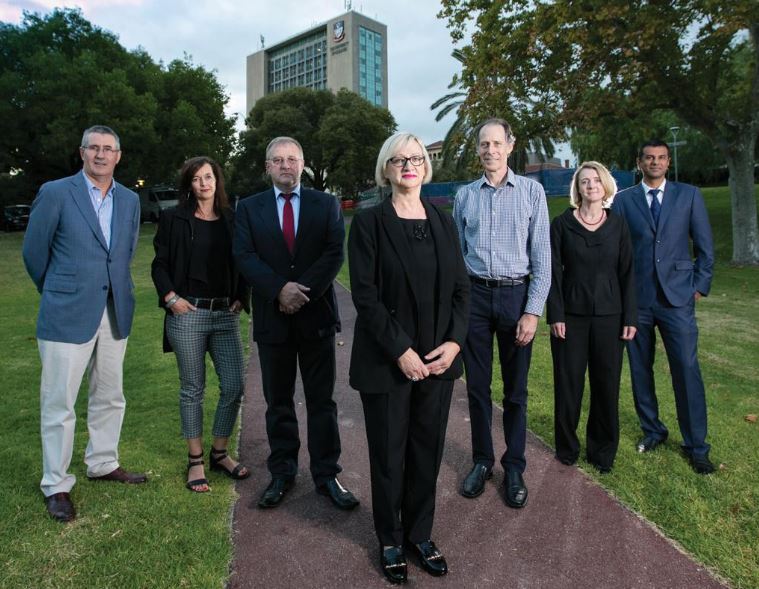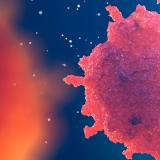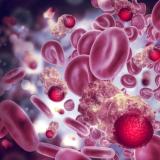Associate Professor Leah Cosgrove and her team have developed a simple blood test to diagnose colorectal cancer. A reliable, non-invasive blood test could augment the National Bowel Cancer Screening Program, either as an adjunct primary screen for those unable to do the stool test, or in triaging positive subjects to colonoscopy. This could help drive a significant reduction in colorectal cancer deaths in Australia.
This story is part of our 10 of the Best, 2015 edition. 10 of the Best is an annual NHMRC publication, showcasing 10 NHMRC-funded health and medical research projects.

Dr Trevor Lockett, Dr Michelle Thomas, Associate Professor Rajvinder Singh.
Worldwide, CRC is the third most common cancer and the second leading cause of cancer death.
Associate Professor Leah Cosgrove and her team set out to improve early detection of colorectal cancer (CRC), Australia’s second most common internal cancer.
Through their research, the team has developed a blood-based test for CRC as an alternative to the current stool-based tests.
'Blood tests are commonly used in clinical practice, so we believed that a blood-based test may find higher community acceptance than a stool test; a tenet that has been supported by recent research,' Associate Professor Cosgrove said.
This is important as the availability of a blood test – in addition to the well-established and validated stool test – could potentially increase the number of people screening and result in a significant reduction in the morbidity and mortality associated with CRC in Australia.
The team identified a specific panel of three protein biomarkers that, when measured together, can accurately identify individuals with colorectal cancer.
Results to date suggest that the test will be able to detect early stage colorectal cancer more efficiently than other screening tests currently available.
'We were able to detect early stage disease and late stage disease with increased sensitivity which is very exciting.
'Earlier detection will allow early treatment when surgical removal is most effective, increasing potential for complete cure.'
However, Associate Professor Cosgrove also stresses the importance and value of the existing practice of faecal screening.
'This could significantly reduce the morbidity and mortality associated with colorectal cancer in Australia.'
'The stool test used by the National Bowel Cancer Screening Program saves lives and its benefits are well established.
'Our test could augment this program by providing a screening alternative for people who want to screen but for personal or cultural reasons are unable or unwilling to do the stool test,' she explains.
'Earlier detection and early intervention lead not only to higher rates of cure but also reduced health care expenditure.'
Associate Professor Cosgrove acknowledges the importance of the NHMRC Development Grant system as a means of translating research into tangible outcomes, with the ultimate aim of commercialisation.
She concludes that this research would not have been possible without the input and dedication from her CSIRO colleagues and other clinical and academic collaborators.
Next steps
A key future focus for Associate Professor Cosgrove and her team will be to establish whether this improved performance translates across the broader population. To do this, she hopes to undertake a comprehensive, five year study that compares this blood test with others in current use to measure their diagnostic accuracy as well as their ability to monitor or predict post-surgical recurrence of disease to help inform post-surgical patient management.
CRC: facts and stats
Colorectal Cancer (CRC) is the third most common cancer in Australia with 16,640 new cases diagnosed in 2014. CRC is a highly preventable disease and when detected early, cure rates can be as high as 90 per cent. Early detection could significantly reduce the health burden of this disease, which is estimated to cost Australia over $2 billion a year in direct health costs.
The current screening process is underutilised with only 33.5 per cent of the eligible population participating in Australia’s National Bowel Cancer Screening Program, which uses a stool-based test. Evidence indicates a robust, blood-based diagnostic tool, if made available as an alternative to the current test, would increase screening participation.



